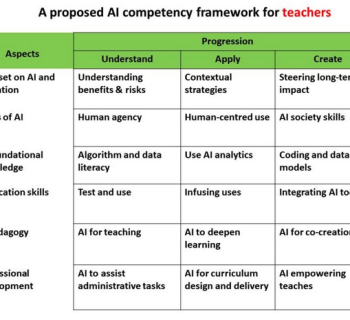 A European Framework for Quality and Effective Apprenticeships (2018/C 153/01) has been published in the Official Journal of the European Union. The Recommendation aims at increasing the employability and personal development of apprentices and contributing towards a highly skilled and qualified workforce responsive to labour market needs. Quality apprenticeships, the EU says, also help encourage active citizenship and social inclusion by integrating people of different social backgrounds into the labour market. The framework sets out 14 criteria in relation to working and learning conditions as well as to framework conditions aimed at providing a common understanding among Member States and supporting their efforts to reform and modernise apprenticeship systems that provide an excellent learning and career pathway.
A European Framework for Quality and Effective Apprenticeships (2018/C 153/01) has been published in the Official Journal of the European Union. The Recommendation aims at increasing the employability and personal development of apprentices and contributing towards a highly skilled and qualified workforce responsive to labour market needs. Quality apprenticeships, the EU says, also help encourage active citizenship and social inclusion by integrating people of different social backgrounds into the labour market. The framework sets out 14 criteria in relation to working and learning conditions as well as to framework conditions aimed at providing a common understanding among Member States and supporting their efforts to reform and modernise apprenticeship systems that provide an excellent learning and career pathway.
Apprenticeships are understood as formal vocational education and training schemes that
a) combine learning in education or training institutions with substantial work-based learning in companies and other workplaces,
b) lead to nationally recognised qualifications,
c) are based on an agreement defining the rights and obligations of the apprentice, the employer and, where appropriate, the vocational education and training institution, and
d) with the apprentice being paid or otherwise compensated for the workbased component.
The Framework sets out the following criteria for living and working conditions:
1. Written agreement
Before the start of the apprenticeship a written agreement should be concluded to define the rights and obligations of the apprentice, the employer, and where appropriate the vocational education and training institution, related to learning and working conditions.
2. Learning outcomes
The delivery of a set of comprehensive learning outcomes defined in accordance with national legislation should be agreed by the employers and vocational education and training institutions and, where appropriate, trade unions. This should ensure a balance between job-specific skills, knowledge and key competences for lifelong learning supporting both the personal development and lifelong career opportunities of the apprentices with a view to adapt to changing career patterns.
3. Pedagogical support
In-company trainers should be designated and tasked to cooperate closely with vocational education and training institutions and teachers to provide guidance to apprentices and to ensure mutual and regular feed-back. Teachers, trainers and mentors, specially in micro-, small and medium-sized companies, should be supported to update their skills, knowledge and competences in order to train apprentices according to the latest teaching and training methods and labour market needs.
4.Workplace component
A substantial part of the apprenticeship, meaning at least half of it, should be carried out in the workplace with, where possible, the opportunity to undertake a part of the workplace experience abroad. Taking into account the diversity of national schemes, the aim is to progress gradually towards that share of the apprenticeship being workplace learning.
5. Pay and/or compensation
Apprentices should be paid or otherwise compensated, in line with national or sectoral requirements or collective agreements where they exist, and taking into account arrangements on cost-sharing between employers and public authorities.
6. Social protection
Apprentices should be entitled to social protection, including necessary insurance in line with national legislation.
7. Work, health and safety conditions
The host workplace should comply with relevant rules and regulations on working conditions, in particular health and safety legislation.








